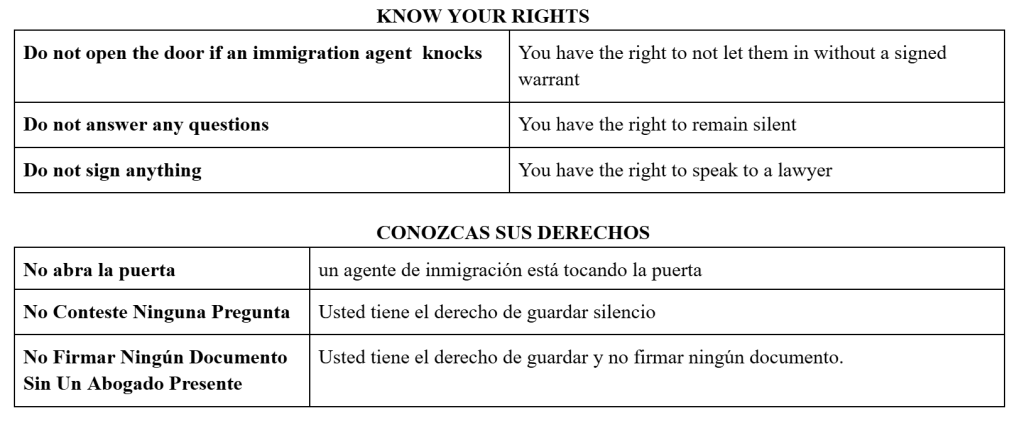Fight ignorance, not immigrants
It’s becoming increasingly numbing to scroll through social media and see post after post about the cruelty being inflicted on the Latinx community. From mass ICE raids to detention centers nicknamed “Alligator Alcatraz,” it’s clear the second Trump administration isn’t removing “illegal immigrants.” Since nobody is illegal on stolen land, it’s really about preserving a whitewashed version of America. What makes it worse is the hypocrisy: the same people cheering for deportations are vacationing in Cancún and Colombia, eating tacos while dancing to reggaetón. Because nothing screams “we hate immigrants” louder than sipping mojitos and calling for the deportation of the people who made them. What we’re witnessing now is targeted cruelty. What we need now is policy led in facts and guided by basic human decency.
According to federal data, 47% of detainees have no criminal record. Fewer than 30% have been convicted of a crime. What’s often overlooked is the psychological harm of deportation — especially to children. The U.S. has used a practice known as enforced disappearance as a deterrent to families; a warning not to come here. Not only is it unconstitutional, against the 8th amendment, it also violates international law: crimes against humanity. Today, over 1,360 children haven’t been reunited with their families, and the practice of enforced separation is happening more frequently due to the Trump administration. Using children as a warning to keep immigrants out is an awful tactic. Immigrants should be welcomed because they bring diversity, entrepreneurship, and strengthen communities.
Anavelis and her 6-year-old daughter, Genesis, came to the U.S. from Honduras in 2018 and their story of enforced separation and disappearance was covered by a PBS documentary. They became one of thousands of families forcibly separated at the border under the first Trump administration’s “zero tolerance” policy. Anavelis was deported back to Honduras without her daughter, while Genesis remained in the U.S., lost in the system for over three years, where she was treated like a thing and not a person. “I was six years old,” Genesis said. “They only told me that [my mom] had to go somewhere.” This is an example of what the research confirms: separation equals psychological violence. So the question becomes: How many more childhoods are we willing to sacrifice in the name of immigration enforcement? If we continue to treat immigrant families as disposable, we’re not just upholding a broken system; we’re willfully inflicting trauma on the next generation. We must prioritize the well-being of immigrant families and work towards more humane and compassionate immigration policies. The long-lasting effects of family separation extend far beyond individual households, impacting the fabric of our society as a whole.
Society for Research in Child Development (SRCD) explains how parental separation denies children critical relationships and essential development and is responsible for creating toxic stress, putting children at risk of developing psychological disorders. In a five-year study of more than 280 adolescent immigrant students in Boston and San Francisco, Suárez-Orozco and his colleagues found that longer separations from parents during the immigration process led to higher rates of anxiety, depression, suicidal ideations, and addiction to substances. While some studies acknowledge limitations such as small sample sizes or lack of direct child input, their conclusions stay consistent across a broad range of research. The emotional and psychological cost of parental deportation is undeniable. A report by the American Psychological Association found that even the threat of deportation can cause children to experience higher levels of anxiety, sleep disturbances, and academic struggles. These stresses cause secondary effects such as economic instability, social and educational disruptions, and strained relationships with remaining parents who are battling with their own mental well-being. With more than 5.5 million children in the U.S. living with at least one undocumented parent (the majority of them U.S. citizens), the emotional damage tied to deportation policies cannot be ignored.
The looming threat of ICE creates a constant state of fear for immigrant families, documented families, and even the POC community as a whole. This pre-trauma — the anxiety of being targeted, feeling watched, and worrying about being taken — leaves lasting damage on its own. Parents live with the fear that a routine drive to work or a trip to the store could end in their arrest. Children worry that their parents might not come home one day. This kind of fear doesn’t stay outside; it travels into homes, into schools, and churches, places that are supposed to feel safe. Many families respond by isolating themselves from public life. They avoid hospitals, schools, even the grocery stores, having to choose invisibility over essential needs. Every outing is calculated and leaves them on edge. Over time, this isolation erodes a person’s sense of dignity and belonging. ICE has perpetuated a cruel message that immigrants are not just unwelcome, but dangerous. The threat of deportation has nothing to do with what individuals have done, it’s all about what they look like, and a system has been built to erase them.
What needs to be done is to educate the public about the immigration progress and the experiences that happen during it, that it is not linear or simple. We also need to combat ICE’s messaging, and make sure people know that not every immigrant is dangerous, instead immigrants have actually have helped bring the crime rate down. According to the American immigration council between 1980 and 2022, the immigrant share of the U.S. population more than doubled, from 6.2% to 13.9%, while the total crime rate dropped by 60.4%. When immigration was at its highest, we went from 5,900 crimes per 100,000 people to 2,335 crimes per 100,000 people. Even if you are not directly being affected you can still rebel against this by taking advantage of apps like Loose and Ice Block; going to protest, and donating to non-profits, like the Immigrant Defense project.
Below is a chart of the basic rights everyone is subject to in the United States, no matter your legal status.










